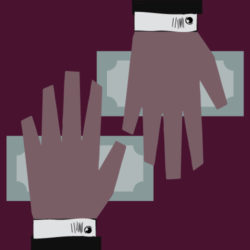The end of the beginning of the war in Ukraine
The United States started the war in Ukraine, declared Vladimir Putin in his long-awaited state of the union address earlier today, thus highlighting the eternal dilemma of any journalist in the age of disinformation: How do you actually cover political speeches that present up as down and black as white?
To sum up: according to the Russian president, despite America’s plans to destroy his country, Russia has emerged victorious, overcoming all the economic troubles of the past year. The future ahead is bright, and it lies with Asia, not with the decadent, rotting West. “Look what they are doing in the West, pedophilia becomes the norm, priests approve same-sex marriage,” the Russian president said. “The West is proposing the idea of a gender-neutral God. Forgive them, Lord, for they know not what they do.” (For context, the pedophilia myth has been cultivated by the Kremlin for a long time.)
Here’s a helpful summary of Putin’s one-hour-and-45-minute long speech, and here’s an alternative, shorter version by the Russian journalist Ilya Krasilschik: “1. He didn’t start this. 2. He started nothing. 3. But he could start something. 4. Everything that’s bad was done by the West, everything good by him. 5. But he did nothing. 6. But he could. 7. Because he does only good things while the West does all the bad things. 8. But he could do bad things too. 9. But he doesn’t.”
As far as the war in Ukraine is concerned, the top headline is: nothing. The first anniversary just marks the end of its beginning.
BIDEN STEALS THE SHOW
If I had to pick one image to describe the New Cold War, or whatever you want to call the current geopolitical standoff, it would be a snapshot of the Russian state TV from Monday, February 20. On one side of the screen was President Joe Biden strolling through the streets of Kyiv hand in hand with Volodymyr Zelenskyy, air sirens wailing in the background. On the other: a portrait of Vladimir Putin, and directly underneath, a bizarre, red, 24-hour ticker counting down the hours, minutes and seconds until Putin’s much anticipated speech on February 21.
A year on since Russia’s full-scale invasion of Ukraine, the Kremlin propaganda machine had been busy enthusiastically promoting Putin’s address to the Federal Assembly. A tsunami of media speculation about the contents of the speech helped the Kremlin spread the word: Would Putin surprise us by ending the war? Would he stage a new assault? Would he freeze the conflict? Would he present the unimpressive showing of his military loss as a victory? For days leading up to the speech, I read as many takes as there are pundits on Twitter.
And then Biden unexpectedly turned up in Kyiv and stole the show.
“Biden’s visit is an act of political hooliganism,” spat out one outraged pundit on the state-owned Russia-24 news channel. “We could’ve killed Biden off, but what’s the point?” pondered another. “Destroy Biden, and look at who’d replace him. Despite Biden’s dementia (fact check: he does not have dementia), at least he has some sense, you can reason with him, while she (Kamala Harris) has no restraints.” Here’s the link to the latter clip with English subtitles.
RUSSIAN SPIN: A YEAR ON
No matter what Vladimir Putin says, things could hardly be going worse for the Russian military. They have almost no territorial gains to show for the jaw-dropping and humiliating human losses, and the infighting inside the war machine is now out in the open. Russia is losing the war.
And yet, globally, the Kremlin has still been able to spin the dysfunctional, self-destructive and violent Russian aggression into a righteous battle for justice. On the first anniversary of the full-scale invasion of Ukraine, here are three real stories that are feeding this spin.
Russia has friends: Take South Africa for example. Just like the Russian tanks that rolled into Ukraine a year ago, the Russian warship, frigate Admiral Gorshkov, that pulled into a port in South Africa this week had “V” and “Z” signs painted along its sides. Having already test-fired hypersonic “Zircon” missiles, the ship is taking part in 10-day naval exercises along with Chinese and South African counterparts.
China, which distanced itself from Russia at the outset of the full-scale invasion, is now considering supplying Russia with weapons. As Biden got on a train out of Kyiv, China’s top diplomat headed to Moscow after 10 days of meeting with leaders across Europe. China is clearly trying on the new role of international peacemaker, but Beijing’s deepening partnership with Moscow is raising alarms in Western capitals. Meanwhile, Putin’s focus on Asia is resonating. As he spoke in Moscow today, his speech was broadcast live by most major television stations in India.
The global anti-war movement supports Russia: Russian state TV channels couldn’t get enough of this weekend’s “Rage Against the War Machine” rally that took place in Washington, D.C. The crowd looked thin as representatives of the American left and right marched towards the Lincoln memorial, holding “Drop Acid, not Nukes” slogans. Speakers included former Representative Tulsi Gabbard, Greyzone’s Max Blumenthal and former Green Party presidential candidate Jill Stein, among many others. With the Russian tricolor flying behind them, speakers demanded that the U.S. stop sending weapons to Kyiv, disband NATO and join China and Russia in creating a multipolar world.
The world has had enough: Growing apathy outside the West works in favor of Russia’s narratives. It is extraordinary how well Ukrainians have told their own story (in part, of course, by being incredibly brave and capable on the battlefield) and managed to hold the West’s attention throughout the past year. At the Munich Security Conference last week, Kyiv’s Western allies pledged continuous support. But it comes at a price. In much of the world, the Ukraine war is seen increasingly as Washington’s war. In Munich, Nobel Peace Prize winner and former Colombian President Juan Manuel Santos warned that the West’s heavy focus on Russia’s invasion risks alienating much of the rest of the world, which is dealing with the consequences of higher energy and food prices.
“Ukraine is sucking all the energy, when there are more than 100 conflicts currently in the world,” Juan Manuel Santos told the New York Times. “There is a dissonance here [with the global South],” he said. “And if this war prolongs itself, the risk of finding less and less support for it is very real.”
MARKING THE ANNIVERSARY
Moscow authorities have issued directives to regional governments on how to mark the one-year anniversary of the so-called “military operation.” Russian news outlet RBK got hold of the guidelines that include:
- Lining up participants to shape giant stars,
- Recording videos in front of war memorials,
- Holding arts-and-crafts workshops including trench candle making, knitting socks and mittens for the Russian troops on the frontline and sewing retro tobacco pouches, embroidered with slogans such as “Onward towards victory,”
- Organizing meetings between schoolchildren and veterans of Russia’s various wars,
- Holding concerts.
All of these activities will culminate in a giant planned rally at Moscow’s Luzhniki stadium on February 24 that Vladimir Putin himself is expected to attend.
WHAT GRABBED OUR ATTENTION THIS WEEK
- This piece from Confidencial, a great newsroom from Nicaragua, on how the Ortega regime is using the Russian SORM system for spying.
- This rather scary read by New York Times’ Anton Trojanovsky and Valerie Hopkins on how Putin is crafting the Russia he craves a year after his invasion of Ukraine.
- This piece from Jon Lee Anderson at the New Yorker, in which he talks to Ukrainians, a year after Russia’s invasion, about the “existential” question of the “need to reassert a Ukrainian identity once and for all.”
- This wild video of kids assembling Kalashnikovs in a kindergarten in southern Russia.
- Another video of Russians in the city of Blagoveshchensk gathering to show their support for the invasion of Ukraine by pouring cold water on themselves.
- This fascinating, analytical Twitter thread from Mark Owen Jones about disinformation in the wake of the Turkey earthquake.
- And these memes of Joe Biden hanging out in Kyiv.
Sign up here to get the next edition of this newsletter, straight to your inbox.







